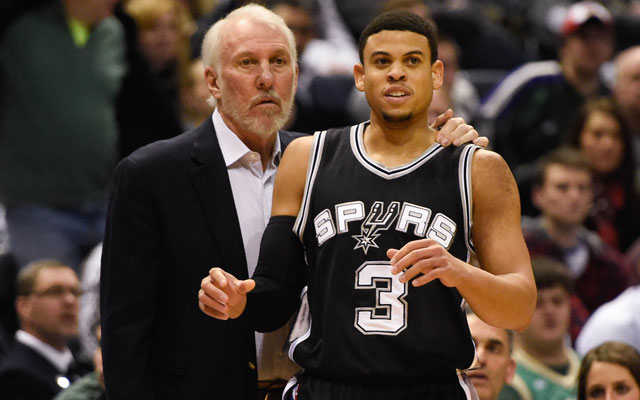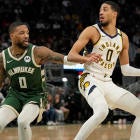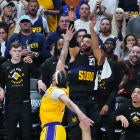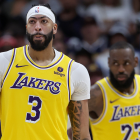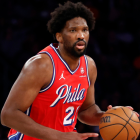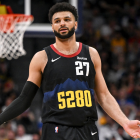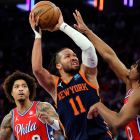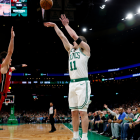AUSTIN, Texas -- To get to Austin from San Antonio is basically a straight 80-mile shot up I-35 that usually takes just over an hour. This is a familiar stretch of highway for San Antonio Spurs guard Ray McCallum, who has traveled to and from the Alamo City to the Texas state capital several times this season. But McCallum is not heading to Austin for BBQ and tacos. He is making the trip up North to suit up for San Antonio’s D-League affiliate, the Austin Spurs.
Purchasing the then-Austin Toros in 2007, the Spurs were just the second NBA team to own their D-League affiliate. Due in large part to how the Spurs used their D-League affiliate, now 19 different teams have their own team.
The Austin Spurs (the team rebranded in 2014), run the same offense and defense as the NBA Spurs which is why San Antonio frequently sends players to the D-League. It allows players like McCallum, who don’t get regular playing time, to seamlessly get a few extra reps. McCallum welcomes the opportunity to play extended minutes and doesn’t see playing in the D-League as a demotion.
“You can look at it however you want,” McCallum said before his eighth Austin Spurs game about his D-League assignment. “I try and look at it as an opportunity. The opportunity to play. An opportunity to use everything I’ve been working on with the coaching staff.
“Normally I get to play a lot of minutes which is always good. Just come out here play and compete. I’ve known a lot of these guys (Austin Spurs teammates) growing up. I moved seven or eight times growing up, so I’ve played with these guys in AAU or seen these guys when I was younger. Coming here and playing with them it's been easy.”
The transition between San Antonio and Austin for McCallum has been easy. He usually finds out the day before that he is being sent to Austin and then the following day, a Spurs front office staffer personally drives him to Austin. McCallum is, after all, an NBA player that is used to certain team luxuries, something that a D-League player is fighting to get. But McCallum is a Spur and the Spurs organization highly values good character, which is why Austin Spurs head coach Ken McDonald hasn’t had to deal with any holier than thou type attitudes when San Antonio assigns a player to his team.
“I’m sure [for] some guys there’s something in their head that’s not quite as excited about being here, but they've all come here with a good attitude,” McDonald said. “We haven't seen anybody with an attitude of any sort. That's not the kind of guys that Pop (Spurs head coach Gregg Popovich) and R.C. (general manager R.C. Buford) add to the Spurs anyway. We are always trying to get them better that's why we are here. And the earlier they buy into that, the quicker they improve.”
This is not McCallum’s first experience in the D-League. He was a second-round pick by the Sacramento Kings in 2013 and spent some time in the D-League during his rookie year. Playing seven games for the Reno Bighorns, McCallum averaged 20 points, 4.3 assists, 3.4 rebounds and two steals in the 2013-2014 season. He made strides in his second year all with the Kings, playing in 68 games and starting 30. However with the Kings signing Rajon Rondo in the offseason, McCallum was not in Sacramento’s long-term plans so they traded him to the Spurs for a second-round pick.
For San Antonio, McCallum filled an actual need. With Cory Joseph signing with the Raptors in the offseason, the Spurs needed some depth at the point guard position and McCallum slots in as their third-string guard behind Tony Parker and Patty Mills. And while McCallum welcomed the trade to San Antonio, he has rarely played. Being in such a limited reserve role, McCallum’s numbers have taken a noticeable dip -- in just 22 games for the Spurs, he's averaging 2.5 points, 1.1 rebounds and 1.3 assists in less than ten minutes a game.
Yet despite his paltry numbers, the Spurs are invested in McCallum as his frequent trips to Austin shows. They want him to develop into a stronger playmaker and floor general. So when McCallum heads to Austin, he is given a simple directive: run the team and be aggressive. And he has done just that, averaging 17.3 points, 4.8 assists and 3.9 rebounds in his nine D-League appearances.
“His job is to run the team,” McDonald said. “There are times out of timeouts, I want him to score because he has that ability. There’s times he has a little leash to go get himself a basket because he is very athletic and very fast.”
When McCallum is sent to Austin, McDonald knows that the Spurs want him to “work on early play calls” and “being a leader on the court,” so he gives the third-year guard a lot of playing time (38.6 minutes a game) to focus on those aspects of his game. But despite McCallum’s NBA pedigree, McDonald is not catering to the Spurs guard’s whims or changing his team’s game plan around whenever the third-year guard is assigned to his team. It does however make him shift his team’s lineup around which results in less minutes for his normal roster. McDonald chalks this up to just being part of the D-League and says his players handle it quite well, mainly because like in San Antonio, the Austin Spurs have developed a strong sense of team.
“That's part of our job,” McDonald said. “Guys will be in rhythm playing really well and then their minutes get cut dramatically for not only a San Antonio Spur but sometimes we have a flexible (the Atlanta Hawks also send players to Austin). That’s something we have to constantly be aware of and try to manage. It's not always easy but we do have a good core group, with good character. I will say it's easier than most teams because of the kind of guys we have on our team. But it's not perfect, guys are human. They are here to try and better their situation.”
This almost seamless transition between the two team cultures is why the Spurs have had success sending players like McCallum, Joseph, Kyle Anderson, Aron Baynes and Nando De Colo to Austin. Not only does Austin run similar plays, the team’s colors, name and message to their players is the same as in San Antonio. The Spurs have even developed players in Austin, like Jonathon Simmons, before bringing them on board. Out of all of the teams with a one-to-one D-League affiliate, the Spurs, in terms of developing players, have created the best one in Austin. They are the model that other teams are hoping to develop with their own respective D-League teams.
San Antonio’s use of their Austin affiliate became this sort of model mainly because of Joseph. After being stuck on the Spurs' bench early in his career, Joseph famously asked to be sent to Austin and his game blossomed. Playing in the D-League allowed Joseph to get consistent playing time and helped to speed up his development and growth as a player. Now after signing a four-year, $30 million deal in the offseason, Joseph is playing for his hometown Raptors and getting mentioned in a rap song by Drake. Joseph counts his development in the D-League for much of his current success.
“All I know is that the D-League was a huge part of my development, especially [with] the Spurs having a self-affiliate,” Joseph told CBS Sports. “Just one team affiliated with the Toros, the Spurs being the only NBA team affiliated with that D-League team. So that was huge. ‘Cause we ran most of the stuff, especially as a point guard, we run most of the plays that they did. Being in that system, getting experience, it was huge for me in my development.”
The Spurs are hoping the same type of development happens for McCallum. And he is totally invested in the process. McCallum relishes playing in Austin and knows that it is only matter of time before he gets an extended opportunity in San Antonio.
“When you get your name called, you just always got to be ready,” McCallum said. “I use these games for that opportunity.”
CBS Sports' James Herbert contributed to this story.
